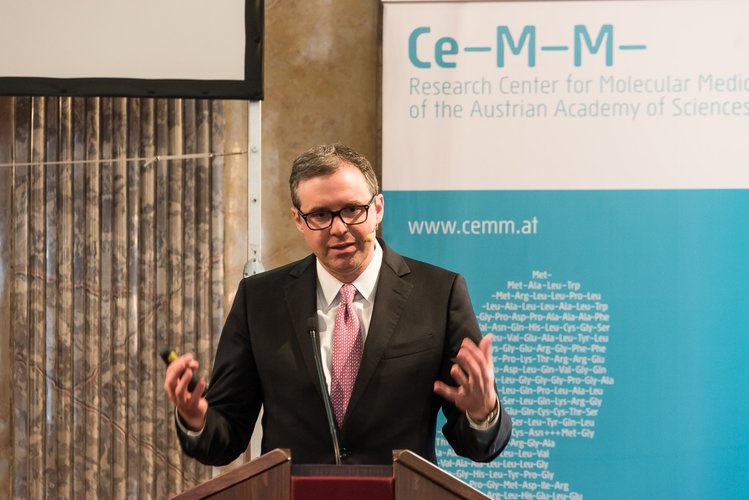Taking out the Cell Garbage with Chemical Degraders
Share
The 11th CeMM Landsteiner Lecture, held by James “Jay” Bradner, President of the Novartis Institutes for BioMedical Research (NIBR) on May 15, 2017, was a truly memorable event: with enthusiasm and with great incisiveness, Dr. Bradner illustrated for the audience principles and examples of medical innovation and eloquently argued about their impact on the whole of humankind.
This year’s CeMM Landsteiner Lecture was accompanied by the wonderful accordionist Otto Lechner, whose music evoked many stimulating emotions in a short time and left the audience of more than 400 people prepared for more virtual adventures. CeMM Scientific Director Giulio Superti-Furga introduced Dr. Bradner as a pivotal figure of the chemical biology community and a visionary innovator, praising the paradigm-changing contributions of Dr. Bradner to drug discovery from a scientific and social point of view. On stage, starting with an historical overview, Dr. Bradner recalled the giants on whose shoulders every medical new modern achievement in drug discovery is built on. From vaccines to antibiotics to biomolecules like insulin – real medical progress was always achieved by radically new ideas and incisive execution.
This is also true for what regards therapy of one of the most intensively researched diseases of our time: cancer. Jay presented the highly significant progress that has been made in cancer therapy the last decades, particular by targeted therapy, exemplified by imatinib/Glivec and and T-cell-based immunotherapy, such as the one involving chimeric antigen receptors (CAR-T cells)
Jay then presented briefly the breakthrough discovery of bromo-domain inhibitors able to reprogram the transcriptional program of cancer cells, such as JQ1, from his own laboratory as associate director of the Broad’s Center for the Science of Therapeutics and as hematologist at Dana-Farber Cancer Institute. The central part of his talk dealt with a yet different, unprecedented approach able in principle to overcome the difficulty presented by so-called “undruggable” part of the human genome. If a protein is difficult to inhibit, how about taking it out of the equation altogether? In other words, to “destroy” it by a chemical strategy? The approach presented, called “targeted protein degradation”, attacks cancer proteins not by inactivating single parts of them, but by dragging them in their entirety to the garbage removal of the cell – the proteasome - where they are destroyed and recycled. Georg E. Winter, now a Principal Investigator at CeMM and present in the audience, has been critically involved in the discovery of these “degronomids” drugs while a postdoctoral fellow in the Bradner laboratory.
While other methods try to find the right key to unlock a given door shut in cancer cells, targeted protein degradation is comparable to an explosive charge that tears the door away completely – with this impressive image, Jay pointed out the game changing difference of his approach. The results of this method speak for themselves: blood cells of leukemia patients treated with JQ1-mediated targeted protein degradation seemed to have “forgotten” that they are cancer cells and thrived like healthy, normal cells again.
The last part of the talk was dedicated to the presentation of a new collaborative paradigm by which Dr. Bradner, now heading NIBR, wants to engage the scientific community. He effectively argued that by sharing tools, reagents and ambitious goals, a new era of public-private partnerships could accelerate the identification of solutions to important challenges in a manner that neither industry alone, nor academia, could achieve alone.
After his talk, Jay answered the many questions from the audience and continued the discussion at the subsequent cocktail reception, meeting literally hundreds of young as well as more senior participants and exchanging views, selfies and coordinates. We want to warmly thank Jay Bradner for his enlightening talk and this wonderful evening!

